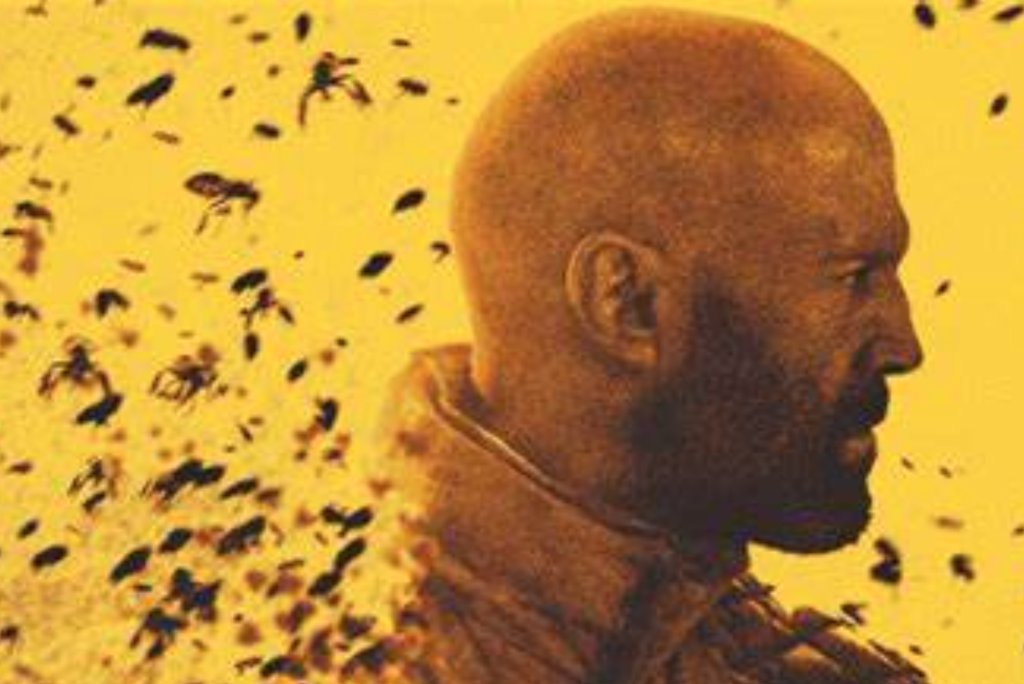

In modern action films there is no right or wrong—only power
Wouldn’t you like to get back at some of the internet scam artists—the kind who prey on old people and get them to give up their credit card information?
This is the starting point for The Beekeeper, a new MGM film. Jason Statham (the eponymous beekeeper) is a secret government hitman whose pal Phylicia Rashad falls victim to such a scheme. She takes her own life. In revenge Statham travels to the scam artists’ lair, kills a bunch of them, and blows the building up. But this is only the tip of the iceberg, because other Big Businesses and the U.S. government are complicit in these schemes, including—spoiler alert—the president’s son. What is the solution? Statham must also go kill them too. Every business and government agency is a legitimate target for Statham. If you watch the trailer you can see Statham walking blithely up to a group of FBI agents and beating them all up. “We have laws for these things!” cries a witness. Statham replies: “Until they fail. Then you have me.”
Maybe it sounds fun? But not to me, because this film is a fictionalized endorsement of the same basic premise that inspired Timothy McVeigh to bomb Oklahoma City in 1995.
Like our friend the Beekeeper, McVeigh believed he was responding to an imminent threat: the US government’s 1993 assault on the Branch Davidians in Waco. McVeigh chose to attack and destroy the threat—that is, the American government—because laws no longer worked. After law fails, for McVeigh and the Beekeeper, problems can only be fixed by violence—specifically by rogue actions of a small cadre or even one man.
When I was growing up we had a word for this sort of thing: terrorism. But Jason Statham obviously can’t be a terrorist because he’s an action star—even though the trailer shows him literally attacking the FBI and setting people on fire.
There’s another word for the behavior of real-life McVeigh and pretend Statham: fascism. The term is overused, but bear with me. Fascism, as a philosophy, is not necessarily connected with any kind of coherent political program. Rather, one of its foundational attributes is the idea that law and democracy are hopeless. They will be corrupted and manipulated by an evil cabal and turned against the people. Therefore, one man (or a small group) must be empowered to do whatever it takes to destroy the cabal and Make Things Right. Hitler and the Nazis took power to defend Aryans against the Jews. Stalin and the Bolsheviks took power to defend the motherland against capitalists. Putin claims power to protect Russia from the decay of Western culture.
And in The Beekeeper, Jason Statham sets people on fire and blows up buildings to protect America against a shadowy group of big business and government elites. The movie’s elites (led by Jeremy Irons) are kitted out in the usual way, with suits and fabulous workplaces and armies of faceless guards. Indeed, the scam artists who rob Rashad to kick-start the plot are working in a modern, sleek office building entirely dedicated to their objectives right here in America. Never mind that most internet fraud comes from small-time hustlers or overseas dark web troll farms.
In other words, The Beekeeper is the film version of American far-right, QAnon violence: It is a movie about how global elites are protected by the U.S. government so they can prey on Americans, and the only way to deal with them is to kill them. It is a film that not only glorifies violence but glorifies violence against the American government. Whether it is meant this way or not, this movie will be a gift to far right recruiters in the conspiratorial world of white supremacy.
It is odd that an industry as associated with the left as Hollywood would make such a film. But then, morally grey antiheroes have been the stuff of action and superhero films for years. It is no surprise that Beekeeper director David Ayer also helmed the joyless 2016 film Suicide Squad, where supervillians do whatever it takes to save the U.S. from I think zombies? Maybe it was alien goo-creatures? I can’t remember.
It’s possible that this film is supposed to be taken ironically, like Deadpool or, well, Suicide Squad, but its marketing campaign seems pretty serious about how cool the Beekeeper is. By extension, it is selling a vision of America where law is irrelevant and violence is the solution. Both of these ideas are morally wrong. They are also dangerous. Hollywood’s action and sci-fi apocalypses have been sliding this way for a while: All crises require violence, panic, and destruction. Indeed, modern catastrophe films often don’t bother explaining why or how the disaster arrives. Netflix’s Leave the World Behind never bothers explaining why the apocalypse is happening; it only seeks to revel in the panic, horror, and distress. America is on edge already, and Hollywood is luxuriating in the panic.
In these films, the world cannot be dealt with or improved. It is not merely that moral actions are difficult. It is that they are impossible. To assume that law can solve our problems is foolish and ignorant. Only power can do that. These films cry out for a strongman to set the world right.
It is a claim directly out of the fascist playbook.
Statham’s Beekeeper explains himself: “I protect the hive. When the system is out of balance, I correct it.”
This philosophy gives Statham the right to murder at will, because only the Beekeeper can be trusted with the public good. It is as close as any mainstream Hollywood movie has come to celebration of the alt-right’s dream of an autocratic America.
Adam Jortner is the Goodwin-Philpott Professor of History at Auburn University, and the author of Audible’s anniversary series, The Hidden History of the Boston Tea Party.
Image: Courtesy Lionsgate